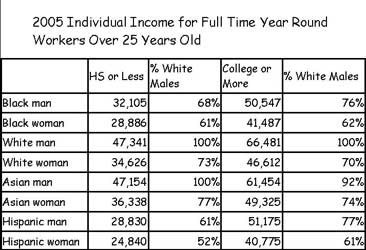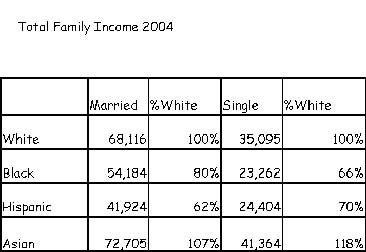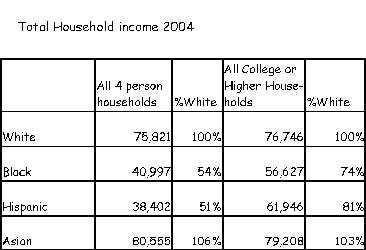Some time during all of the time that the Duke rape scandal first erupted there was an interesting exchange in the comments section on my blog. A reader linked to this article, which includes the following quote:
Black and Asian women with bachelor’s degrees earn more money than similarly educated white women, and white men with four-year degrees still make more money than anyone else.
 My immediate reaction was, no Black women don’t earn more than White women; where does this data come from? So I decided to go to the Census data and see what it revealed. Sure enough the 2004 Census reveals similar numbers, but I was still convinced that something was wrong with this picture. Then it hit me. What this measure does is compare all college educated men and women whether they are in the labor force full time, part time, or not at all. Are college educated Black women really faring better than their White female counterparts in the labor force? The answer is no. In fact, this is a great example of how statistics can be misread and or misleading.
My immediate reaction was, no Black women don’t earn more than White women; where does this data come from? So I decided to go to the Census data and see what it revealed. Sure enough the 2004 Census reveals similar numbers, but I was still convinced that something was wrong with this picture. Then it hit me. What this measure does is compare all college educated men and women whether they are in the labor force full time, part time, or not at all. Are college educated Black women really faring better than their White female counterparts in the labor force? The answer is no. In fact, this is a great example of how statistics can be misread and or misleading.
 In order to understand what is wrong with using this measure it is important to think about the idea of statistical controls. These figures did not control for the woman’s involvement in the work force. A slightly better comparison would be to look at people who are of similar education, and a similar labor force status. So I decided to look at only those college educated workers who were in the labor force full time year round. When you compare similarly situated women and the gap between White women and Black women reverses, so White women in this position are earning more. The table also shows that this holds true for those women with a high school education.
In order to understand what is wrong with using this measure it is important to think about the idea of statistical controls. These figures did not control for the woman’s involvement in the work force. A slightly better comparison would be to look at people who are of similar education, and a similar labor force status. So I decided to look at only those college educated workers who were in the labor force full time year round. When you compare similarly situated women and the gap between White women and Black women reverses, so White women in this position are earning more. The table also shows that this holds true for those women with a high school education.
So what is going here? The explanation is actually simple. White women are more likely to be out of the labor force or in the labor force part time. This is largely because White women are frequently married to White men, who are the highest earners. White men’s much higher incomes make it feasible for White women to be less connected to the labor force, compared to Black women.
Another interesting thing to note about these charts is the position of Black men. College educated Black men earn more than all women, including White women, but they earn less than Asian, Latino, and White men. However, this pattern does not hold true for Black men with high school or less. Less educated White women earn more than less educated Black men.
Lately, I have heard several recent discussions insinuating that Black men are in a better economic position that White women; however, I think overall White women tend to be in a better financial position than Black men. I say this because the data in the two charts above reflects personal income. The vast majority of people do not live alone…they live in households or families.. The Census Bureau defines households and families as two different sets of living arrangements. Here is a quote:
Household A household includes all the people who occupy a housing unit as their usual place of residence. Family A group of two or more people who reside together and who are related by birth, marriage, or adoption.
 Since the majority of Black men are married to or living with Black women and the vast majority of White women are married to or living with White men, their living situations are probably best measured by looking at household or family measures as the two tables on the right do. The first table looks at family incomes for both single mother households and married households, and it is not disaggregated by education.
Since the majority of Black men are married to or living with Black women and the vast majority of White women are married to or living with White men, their living situations are probably best measured by looking at household or family measures as the two tables on the right do. The first table looks at family incomes for both single mother households and married households, and it is not disaggregated by education.
 The next table covers households. In this table I looked a four person households, and only those household where the head of household had a college degree or higher. It is evident from these tables that Black and Latinos fair particularly poorly compared to their Asian and White counterparts. While individual income is useful at gauging discrimination against individuals in the labor force, it is not as useful when examining the actually living conditions of people. The only people who this measure would be applicable to is people who live alone (this group is growing, but even many single people have roommates or others they share homes with
The next table covers households. In this table I looked a four person households, and only those household where the head of household had a college degree or higher. It is evident from these tables that Black and Latinos fair particularly poorly compared to their Asian and White counterparts. While individual income is useful at gauging discrimination against individuals in the labor force, it is not as useful when examining the actually living conditions of people. The only people who this measure would be applicable to is people who live alone (this group is growing, but even many single people have roommates or others they share homes with
So let me get back to the main point here……Black women are not fairing as well as White women when it comes to their financial situation, and this difference cannot be explained away by the higher rate of single parenthood or lower level of education. When Black women and White women have similar levels of education and a similar position in the labor force (full-time, part time, or unemployed ), White women earn more (I actually did look up income for unemployed women, and unemployed White women do have more income coming in.). Unfortunately, the AP report mentioned in the beginning of this article failed to take account of the fact that many college educated White women are working part time or are taking time out of the work force, especially if they have a White male partner who is a high earner. This case is a prime example of how statistics can be misleading. Many people who read that article are probably convinced that Black women are truly fairing better in the job market than White women, but it is not so.
(Sorry that the graphs are so ugly….I’m having a hell of a time learning this program.) If you want to look up data on income, the following link has the data used in these graphs.
This is also posted at my blog Rachel’s Tavern.



Pingback: Workplace Prof Blog
Pingback: Feminist Law Professors
Pingback: feminist blogs
Pingback: sonitus.org
Pingback: feminist blogs
Pingback: FeministBlogosphere
While I agree with your conclusion I’d still like to add that being in a relationship with someone who has money isn’t the same as having those money yourself.
From what i’ve personnaly seen it might actually make you even more powerless than being poor on your own, since the one with the money is the one being able to make all the decicions – and all to often do whatever they can to keep it that way.
B, I think that’s often true. It’s also not at all uncommon for the non-working wife to actually have more say about how the money is spent than the husband. At least, I’ve known many families with this sort of arrangement. Of course, this isn’t *real* power, but, depending on the particular marriage, it might be close enough.
B I totally agree with your sentiment. Having a spouse with money may get you access to better schools or neighborhoods, but it doesn’t mean you have power in your relationship, and it often means that your status is dependent on someone else. I think that is very true.
The “power” in this situation is completely grounded in the interpersonal relationship. Sure, some housewives seem to rule the roost. But it can also mean the opposite.
I went to a workshop on DV last week, and it was pointed out that the women who had the most trouble leaving an abusive relationship were poor women (no surprise there) and THE WEALTHY. The poor for all the obvious reasons–lack of education, good job, affordable housing. The wealthy because their husbands tend to be influential in the community and have access to high-poweredlawyers who can leave the wives penniless, homeless, and, in some cases, without custody of their children.
Yes, poverty is always a disadvantage. But being allied with someone with wealth may not necessarily translate into an advantage.
From the linked census site (2005 numbers are not available on the site, the numbers are from the 2005 publication) :
A white female High School graduate working full time in 2004 has a mean income of 31,026.
White women with a Bachelors working full time earned a mean 50,966.
From PINC-03–Part 265
Black women in the same situations earned 25,496 and 44,193 respectively.
From PINC-03–Part 267
Your conclusions remain valid, but where are your numbers from?
I’ll give you the exact charts. Most researchers do not use means for income because they tend to be artificially high. For example if I give your the numbers 10,12,20,30,250, the mean is 64.4, but the median is 20. Median is basically the middle number, and mean is usually called the average. (I’m going to go back and change the word average to median, for clarity purposes.) The super rich cause the mean income to go up, but since the median is the middle number they have no effect on it. Let me get the charts…..
numbers, you’re right about the year…….the release date is always a year after the actual earnings anther point I should have clarified. This is the page that I used for the person income data. I used only medians…..
Here is the chart for white women—http://pubdb3.census.gov/macro/032005/perinc/new03_265.htm
I used the median income figures numbers from the first column, which are all women under a bachelor’s degree (a few have some college), but the bulk are HS graduates, and I used the data from the 7th column. I used the words college or more in the graph, which includes PhDs, MAs and so on. That is captured by the 7th column. (I used the same columns for the black women.
You’re a good number’s detective. I’m going to put a note that all numbers are medians.
Although you are right that the median income is probably more relevant to your discussion, “average” always implies mean. Thanks for the clarification and for delving into this topic in the first place.
When I want to talk about medians but use a less technical-sounding word, I usually say “typical.” Not sure if anyone in the world but me knows how I mean that word, though.
The median is really a measure of position, so if I were describing a median, I would be referring to the number in the middle position. I don’t know if I would say typical. Average tends to imply a mean, but I think most researchers just assume people know this ,and we use the term average. The super rich folks of the world (Bill Gates, Donald Trump, and so on) really skew means upward, but extreme values don’t pull up medians.
I really need to find a synonym for average when I am discussing medians because it is a little confusing to people.
I would think (and interpret) “typical” to generally mean modal. In social science discussions, although there are exceptions, mostly we talk about things that fall on a normal distribution. Unless you’ve got a bimodal or heavy-tailed distribution, the mode is a very handy shorthand for “just regular guy/gal”. This may derive from my stats background coming most recently from a business context; in business, the mode is where the big crowd of customers is.
Minor corrections: Average doesn’t imply mean, it means mean. Extreme values do pull up (or down) medians, they just don’t it any more strongly than does any other higher- or lower-than-median value.
Robert,
Average means mean, but it also means mode, median, geometric mean, etc. The average is a measurement of central tendency, and all of those examples are measurements of central tendency, so they are all averages.
I agree that typical is a better description for the mode than for the median. This is most obvious in a strongly bi-modal situation, where the median may not be at all typical. However, mode is a measure that is very influenced by the size of the bins, so it seems to me that I rarely see it used (in the social sciences). I can see the use of typical for median on the basis that people are as likely to be better off or worse off than the median, particularly lacking a better lay term to imply median.
Charles said, “I agree that typical is a better description for the mode than for the median. This is most obvious in a strongly bi-modal situation, where the median may not be at all typical.”
I also think typical is better when discussing modes. And I think modes are generally more meaningful, when you look at attitudinal questions (especially nominal and ordinal variables–for people who know stats speak).
Here is an example where a mode would be better. Let’s say the question is.. “How do you feel about the war in Iraq?” And your results are: strongly support (10%), support (25%), oppose(45%), strongly oppose (20%). The mode would be “oppose.”
I also think variables such as number of children people have, would be better as a mode.
B I totally agree with your sentiment. Having a spouse with money may get you access to better schools or neighborhoods, but it doesn’t mean you have power in your relationship, and it often means that your status is dependent on someone else. I think that is very true.